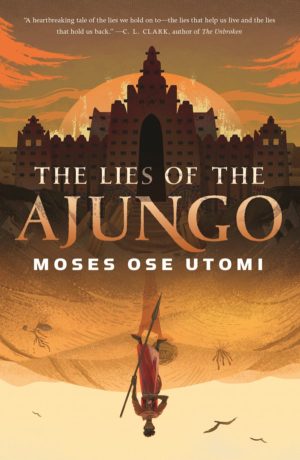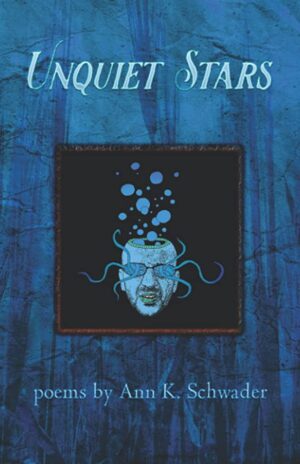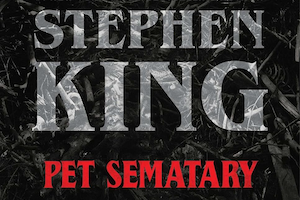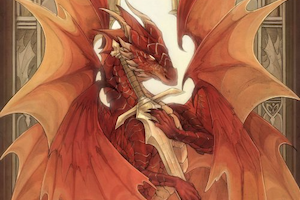Welcome back to Reading the Weird, in which we get girl cooties all over weird fiction, cosmic horror, and Lovecraftiana—from its historical roots through its most recent branches.
This week, we cover a selection of Ann K. Schwader poems. “Lavinia in Autumn (Sentinel Hill)” first appeared in Dark Energies in 2015, and can be most easily found in Mike Davis’s 2016 Autumn Cthulhu collection. “Final Library” first appeared in the Summer 2018 issue of Spectral Realms. “Haunted Innsmouth” first appeared in 2017 in Joseph S. Pulver, Sr.’s A Walk on the Weird Side. “A Wizard’s Daughter” first appeared in Weirdbook Annual 2 in 2019. “The Language of Forgotten Gods” first appeared in 2021 Weird Fiction Review. The latter four can be found in Schwader’s 2021 Unquiet Stars collection. Spoilers ahead!
“Epigraphers (without a second thought) transcribe from temple ruins, verse by verse, the language of forgotten gods. Is not pale summary enough?”
More than any other literary mode, poetry defies condensation into a helpful summary. This is particularly true of shorter poems and those with a more lyrical than narrative focus, like those we’re considering in this week’s blog. Of “Lavinia in Autumn (Sentinel Hill),” for example, I could write—and not facetiously—that it’s about Lavinia (and Sentinel Hill) in autumn. I guess I could add that Schwader’s talking about Lavinia Whateley, and that Sentinel Hill looms over Dunwich in Lovecraft’s alternate New England. I could throw in a line or two, like “[Lavinia] Still feels the star-winds blow/From distant space where chaos keeps its throne.”
Buy the Book


The Lies of the Ajungo
We can only do full justice to a work of art by devouring it whole. Again, this is especially true of short-form poetry, where the need to make every word count is greatest and where we can take the entire piece in one hand and turn it round about until we get it: the ingenuity and grace with which the poet has adhered to a formal structure or to a structural variation of their own; the way meaning can dodge and feint in so small a space, maybe to elude us, maybe to end up in our game-bag, the hunt worthwhile in either case.
I can heartily recommend getting Schwader’s collection, Unquiet Stars, and reading the poems under discussion word by weird word. This book is packed: more than fifty poems, including a suite of nine sonnets inspired by H. G. Wells’s Island of Dr. Moreau that rivals the eeriness of the novel. “Lavinia in Autumn” is in Mike Davis’s Autumn Cthulhu, another compendium tasty at any time of the year.
What’s Cyclopean: “Wise idiot” humans make messes with “ape-faith,” resulting in skies “cracked black with nightmares.”
The Degenerate Dutch: “A Wizard’s Daughter,” “Lavinia in Autumn,” and “Haunted Innsmouth” all explore the aftermath of cross-breeding between humans and something else. Sometimes the something else is dangerous; sometimes the humans are.
Weirdbuilding: This week’s poems call directly back to “The Thing on the Doorstep,” “The Shadow Over Innsmouth,” and “The Dunwich Horror”.
Libronomicon: Palimpsest manuscripts, older text almost scraped away, are candy to researchers. In this case the candy is very, very bad for you.
Anne’s Commentary
All the poems we’ve selected make deft use of classic forms. “Lavinia in Autumn” and “Haunted Innsmouth” are Italian sonnets true to the standard octet-sestet structure and ABBAABBA CDECDE rhyming scheme. “Final Library” is a variation on the Elizabethan sonnet, interlocking the two four-line divisions of the octet and the octet to the sestet with a rhyming scheme of ABAB / BCBC / CDCD, plus a standard closing couplet, EE.
Schwader’s just begun to reveal her poetic chops. In the Writers.com article “What is Form in Poetry?”, the question is posed, “So, which one of you is the poet who hates sestinas, and which one of you is the poet who hates villanelles?” I don’t know what Schwader’s emotional reaction to these two notoriously difficult forms may be, but she demonstrates impressive facility with each.
“The Language of Forgotten Gods” takes on the villanelle, morphed by English adopters from its Renaissance rusticity to a master challenge; see the above article for details, if you dare! Basically, the villanelle features two different repeating lines (refrains) combined with non-refrain lines in a five tercets and one quatrain of a monstrously complex rhyming scheme. Cleverly (slyly) Schwader makes the title of her poem the first refrain, “the language of forgotten gods,” minus the “is not” with which it appears elsewhere in the pattern. The second refrain is “our spirits harbor, though our flesh forgot.” Also clever (sly) is how Schwader allows the words thought, sought and ought to rhyme with forgot, not, plot, and allot.
“Forgotten Gods” pairs with “Final Library” to echo Lovecraft’s opening sentiments in “The Call of Cthulhu.” We humans ought to stick to the kind of “ape-faith” that overwrote the gospel of the outer gods with the “placid…ignorance” [HPL’s words], the “layered ignorance” [Schwader’s words], of our own theology. Alas, epigraphers blithely transcribe “from temple ruins, verse by verse” the instructions for the usurpers’ return. Eventually “the sciences” [HPL] and “some wise idiot” [Schwader] will have “uncloaked each syllable, each fatal turn of phrase, and called it scholarship.” Oops, now we’ve done it, and “the sky outside/Cracked black with nightmares as our last hope died.”
“Haunted Innsmouth” uses the form of the Italian sonnet to perfection, right down to the sometimes missed “argument” between the first eight lines (the octet) and the final six (the sestet). Here the octet proposes that Innsmouth is haunted by your garden-variety ghosts: a “subtle presence,” “shadows [that] seep between/Cross-boarded windows,” “spectral fingertips,” “wraiths of mist.” The rumor is that Innsmouth residents have achieved “the worm’s defeat,” that is, they’ve cheated death. Well, that may be true, but comes the response of the sestet, the volta or sudden leap into a counterargument. “No spirit lingers” in Innsmouth. Its “shadow” is “flesh made strange through dealings with the deep.” Innsmouthers who are the children of such “abyssal rites” are immortal (barring sufficient violence to penetrate their tough frog-fish hides.) Immortality comes at the price of drastic metamorphosis that leaves “Obed’s kin…timeless exiles, shuttered from the sky.” “Shuttered” is a superb word choice here, expressing both fates of an emerging Deep One, first to be hidden away behind actual window-shutters, then to be closed off from the sky by the depths of the sea. “Exile” evokes a desolate state, which I read as the opinion of the sonnet’s implied narrator, undoubtedly human—as even Lovecraft concedes, for a Deep One it is “wonder and glory forever” to dwell in “many-columned Y’ha-nthlei.”
Next come the two poems devoted to the rare female characters in Lovecraft’s work. “Lavinia in Autumn (Sentinel Hill)” is another Italian sonnet to perfection. The first four lines of the octet describe the hill itself: crowned by an ancient stone circle, haunted by such “ancestral echoes” as call “shadows out of autumn,” the ghosts of those sacrificed in rituals no longer quite so bloodily practiced. For the moment. The second four lines turn to Lavinia, Lovecraft’s poor deformed albino, horrendously exploited by her wizard father and ultimately reviled by her monstrous son. Schwader, however, dignifies her in a single phrase as “Soul sister to the whippoorwill and crow,” as sensitive to the “star-winds” as such knowing and mystical birds are supposed to be. The volta into the sestet is more subtle here than in “Haunted Innsmouth”; these six lines confirm Lavinia as no mere victim, allow her sufficient perception and wisdom so that “these columns [of the stone circle] hold no mysteries for she/Who traced their patterns from her freshest days.” She knows to what the patterns lead, to what fading away of humanity a “shredding” of the veil between the Old Ones and our world must lead.
The dedication of “A Wizard’s Daughter” is “(For Asenath, at last).” I don’t think Schwader owes an apology to Asenath or anyone else who was awaiting her take on Ephraim Waite’s daughter—the poem is a sestina, which is if anything more devilish to execute than the villanelle. You don’t need to worry about rhyming, but you must choose six key words to close the lines of each of six sestets. Wait a minute. Six words, six lines per sestet, six sestets: That’s 666, so I was right about who must have invented this form! For extra dollops of torment, you don’t get to choose the order of the six terminal words after you’ve put down the first sestet. And the last stanza is a tercet that must include two of the key words on each line, one internal, one terminal. Have I left you totally confused yet? Never mind. If you’re interested, see that Writers.com article linked above—it has the best explanation of the sestina form I’ve read yet, one clear enough that I was able to analyze “A Wizard’s Daughter” and be awed by how well Schwader managed Form #666. Her sole deviation was in the order of the key words in the closing tercet, but who cares? Despite all the technical constraints of the form, Schwader’s poem flows as if there were no constraints to speak of.
The six key words of any sestina should, or even must, be those at the heart of its subject matter. Schwader chooses these: child, sire, form, will, wisdom, blood. Asenath is the child of her aged sire Ephraim. Ephraim may have much arcane wisdom, but he undervalues Asenath because of her inferior female form—to extend his waning life with his magical abilities intact, he believes he’ll need to possess a male form. Kwisatz Haderach much? Secure in the power of his own will, Ephraim overlooks the potential for will and wisdom Asenath may have inherited from her ever-veiled mother, presumably a Deep One; how will that blood bloom in Asenath?
As Schwader—and many more of us—would have it, Asenath triumphs over Ephraim, retaining or regaining her own form by virtue of her “hybrid spirit” and leaving her dying sire to realize that will prevails in many forms, one being this child of his blood and that other’s.
It’s Asenath Victorious, far from “Thing on the Doorstep” canon, but how satisfying. “A Wizard’s Daughter” is a fine laurel crown for this our Muse of Poetry on her first week of celebration!
Ruthanna’s Commentary
Modern Lovecraftian poetry is a reflection across time, or maybe a warped version of one of those symmetrically artistic paper cuts. Lovecraft tended, in his own poetry, to lay out ideas that he’d later flesh out into central Mythos stories—which we then riff on in decades of Lovecraftian mimicry, homage, and deconstruction—and then distill down into new poetry reflecting how those ideas have changed.
Schwader offers a wealth of examples across multiple collections, and I was hard-pressed last week to pick a sample. I ended up with a pair of poems on things man was not meant to research, and a trio of odes to characters who die in Lovecraft stories unmourned (or at least unmourned by Lovecraft). As with Lovecraft, all are formal poetry: three sonnets, a villanelle, and a sestina. The structures of the forms echo the ways Schwader plays with the original story material, full of repetitions and reversals.
So first, the bad-idea scholarship poems: “The Language of Forgotten Gods” and “Final Library.” In originally scanning these I thought they might draw elements from “The Shadow Out of Time,” but on closer inspection they’re more focused on general tropes—though I did wonder if the accidentally-summoned nightmares of “Final Library” might be related to flying polyps.
“Language of Forgotten Gods” is my favorite of the two, with its titularly appropriate linguistic games. In traditional villanelle form, it repeats, “our spirits harbor, though our flesh forgot” and “the language of forgotten gods. Is not.” But then then that repetition feeds into a sonnet-style volta, making the new perspective a literal flip of the language: “the language of forgotten gods is not our spirits’ harbor, though our flesh forgot.” The poem warns against unthinking transcription—while itself being not mimicry of older stories and forms but reinterpretation. “Pale summary” it’s not!
The poem’s opening also intrigues: the titular language is far from ours, but also “no farther than a curse.” Copyeditors have drilled into me that “farther” describes literal distance while “further” is reserved for metaphorical distance. So there’s a literal distance between our language and the forgotten one—and that distance is the distance of a curse. It’s ambiguous—or maybe irrelevant—whether the curse in question is obscenity or “may you grow like an onion with your head in the ground. Perhaps it’s both. Reading the curse is sufficient to bring the forgotten language back in touch with our own, making it all too speakable by human tongue. Also ambiguous: whether it’s success or failure that brings destruction. Did someone screw up a glottal stop? Or transcribe too well? Or, again, both?
Next up, the direct story-riffs. “A Wizard’s Daughter” is epigrammmed “for Asenath, at last,” but all three might be similarly labeled. In “The Thing on the Doorstep,” Asenath Waite’s body is stolen by her father before that body ever appears on-screen; Schwader turns Ephraim’s fate into vengeance from both her and her unnamed Deep One mother. In “The Shadow Over Innsmouth,” Innsmouth is raided and Devil’s Reef torpedoed; Schwader shows us a town haunted by both ghosts and the living-but-changed. In “Dunwich Horror,” Lavinia is despised and then killed; Schwader shows her at home and sure of herself on Sentinel Hill.
“A Wizard’s Daughter” is the only sestina of the set. The repeating words are form(s), blood, will, child, sire, and wisdom. Three concrete, two abstract, and “form” ambiguous between the two states: appropriate for a tale of minds versus bodies. The poem takes this binary further, criticizing Ephraim for focusing on wisdom from books, neglecting other sources of wisdom as easily as he dismisses the worth of women. And so he misses that Asenath is her mother’s child—and that her mother (unnamed, veiled) is ancient and undying and must surely have opinions about the wizard seeking his own immortality through their offspring. Deep Ones, dwelling in wonder and glory beneath the waves where paper degrades rapidly, offer wisdom of the body that he doesn’t understand. Per “Haunted Innsmouth,” Deep Ones “shall never die except by violence—nor live unchanged in Open Air.” Ephraim fails to grasp the implications of both– and loses his new body as a result.
“Lavinia in Autumn,” too, blurs death and immortality. Lavinia dies—but if she’s “soul sister” to harbinger crows and soul-chasing whippoorwills, what does that mean? Then there’s the line about “a veil between the Ones who were—are still to be– and summerlings whose lives must fade away.” It’s easy to interpret this as Wilbur’s “clearing off of the earth”—except that the line from “Dunwich Horror” is “after winter, summer”. Summer is the time of elder gods, not humans. No season lasts forever. So beyond the story’s memento mori for humanity, those Lavinia died to summon must eventually fade themselves. To be replaced by what “sharper gales”?
Next week, join us for Chapter 8 of Hilary Mantel’s Beyond Black.
Ruthanna Emrys’s A Half-Built Garden is out! She is also the author of the Innsmouth Legacy series, including Winter Tide and Deep Roots. You can find some of her fiction, weird and otherwise, on Tor.com, most recently “The Word of Flesh and Soul.” Ruthanna is online on Twitter and Patreon, and offline in a mysterious manor house with her large, chaotic, multi-species household outside Washington DC.
Anne M. Pillsworth’s short story “The Madonna of the Abattoir” appears on Tor.com. Her young adult Mythos novel, Summoned, is available from Tor Teen along with sequel Fathomless. She lives in Edgewood, a Victorian trolley car suburb of Providence, Rhode Island, uncomfortably near Joseph Curwen’s underground laboratory.














